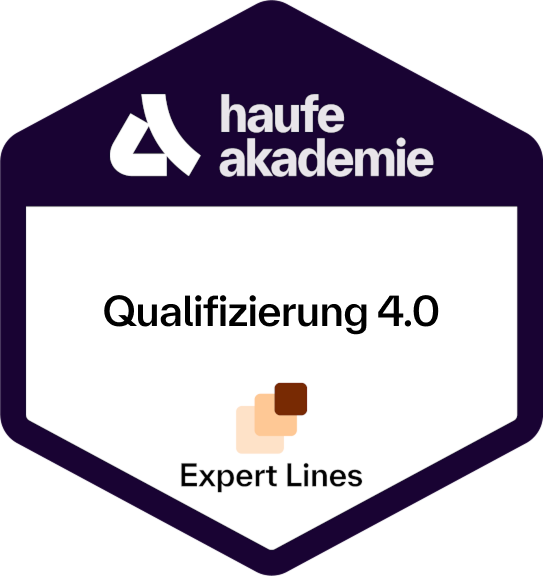AI automation and data science for controlling and finance
Artificial intelligence qualification program - models and use cases

- Introduction to Large Language Models (LLMs) - with a focus on real practical cases from finance, controlling and risk management.
- From the basics to the application: What is a prompt? How does prompt engineering work? How does it create controllable AI workflows?
- Step-by-step implementation of modern RAG workflows (Retrieval Augmented Generation) for the financial sector:
- Document upload, automated chunking, embedding, vector search and semantic search in your own data.
- Practical application with invoice PDFs, contracts or other financial documents.
- Introduction and use of no-code tools such as LangFlow for fast, visual process automation.
- Visualization and comparison: No-code flows vs. Python code - understandable for everyone.
- Understanding how to apply AI-supported document analysis and Q&A systems to your own data.
- Group and individual exercises: From the initial idea to a functioning AI solution in your own context.
- Theory & practice of the automation framework:
- Introduction to a tried-and-tested framework for identifying, evaluating and designing AI automation projects.
- Workshop: Application and practice phase with realistic examples from finance/controlling.
- Direct transfer: After the module, you will recognize suitable processes and design your first projects.
Goal: You not only understand the technology, but also build your first AI-supported financial workflows and have a real toolbox for practical use.
- Hands-on with AI tools for finance, controlling & accounting:
- Development of own reporting and accounting assistants (e.g. for double-entry bookkeeping, automated evaluations).
- Reporting workflows with SQL agents, charting agents and writing agents (e.g. automatically generated reports with graphics).
- Automated fraud and anomaly detection using AI - visually with LangFlow, but also "under the hood" with Python integrations.
- Combination of No-Code and Python:
- Non-programmers can also take part - professionals can go deeper if required.
- Live demo: Integration of Python nodes in LangFlow for more complex logic.
- Application in everyday business: typical finance automation projects.
- Automation framework (deepening & application):
- In-depth exercises: Selection and outlining of concrete automation projects that can be implemented with agents or AI workflows.
- "From idea to proof of concept" - developing your own roadmap for implementation with modern AI technologies.
Goal: You develop your own automations, combine no-code and Python solutions and are ready to optimize processes in the financial sector with the help of AI.
- Modern multi-agent systems with LangGraph, AutoGen and Python:
- Overview: What are AI agents and how are they used in the finance/controlling context?
- Practice: Building self-reflecting reporting agents that check and optimize their own results and correct errors independently.
- Forecast agent frameworks with self-evaluation: time series analysis and automatic validation of forecast quality (e.g. cash flow or sales forecast).
- Simulation & live tests:
- Develop, test and improve your own AI agents.
- What does "self-reflection"/"self-evaluation" mean in practice and how do you use it for robust AI automation?
- Practical benefits: Automated, robust AI workflows that not only perform tasks but also continuously improve themselves.
- Automation framework in the agent context:
- Methodical roadmap: From process analysis to proof-of-concept for complex automation with agents.
Objective: You will learn about the latest agent technologies, build your own self-improving workflows and be ready for the next level of AI automation.
- Direct transfer to corporate reality:
- Analysis and selection of automation potential in your own company using a structured AI automation framework.
- Step-by-step: Identification, evaluation, prioritization and conception of your own AI automation project.
- Development of an individual AI use case including business benefits, resource estimation and implementation outline (functional & technical).
- Application of the framework for concrete planning of the technical implementation, including interfaces, data preparation, integration of LLMs, machine learning and automation tools.
Goal: You develop an implementable automation concept that can create immediate value in your company.
- Presentation of your individual use cases:
- Presentation of your project, including cost-benefit analysis, workflow, technical and organizational implementation.
- Peer and trainer feedback: discussion and fine-tuning with the group.
- Joint sharpening of practical projects for maximum company benefit.
- Implementation recommendations and next steps for implementation in everyday working life.
Goal: You will receive valuable feedback, strengthen your implementation skills and complete the program with a sustainable automation project that delivers real added value for your company.
Contents
Module 1: AI basics, RAG and LLM applications (2 days, live online)
- Introduction to Large Language Models (LLMs) - with a focus on real practical cases from finance, controlling and risk management.
- From the basics to the application: What is a prompt? How does prompt engineering work? How does it create controllable AI workflows?
- Step-by-step implementation of modern RAG workflows (Retrieval Augmented Generation) for the financial sector:
- Document upload, automated chunking, embedding, vector search and semantic search in your own data.
- Practical application with invoice PDFs, contracts or other financial documents.
- Introduction and use of no-code tools such as LangFlow for fast, visual process automation.
- Visualization and comparison: No-code flows vs. Python code - understandable for everyone.
- Understanding how to apply AI-supported document analysis and Q&A systems to your own data.
- Group and individual exercises: From the initial idea to a functioning AI solution in your own context.
- Theory & practice of the automation framework:
- Introduction to a tried-and-tested framework for identifying, evaluating and designing AI automation projects.
- Workshop: Application and practice phase with realistic examples from finance/controlling.
- Direct transfer: After the module, you will recognize suitable processes and design your first projects.
Goal: You not only understand the technology, but also build your first AI-supported financial workflows and have a real toolbox for practical use.
Module 2: AI automation & no-code/Python integration (1 day, presence)
- Hands-on with AI tools for finance, controlling & accounting:
- Development of own reporting and accounting assistants (e.g. for double-entry bookkeeping, automated evaluations).
- Reporting workflows with SQL agents, charting agents and writing agents (e.g. automatically generated reports with graphics).
- Automated fraud and anomaly detection using AI - visually with LangFlow, but also "under the hood" with Python integrations.
- Combination of No-Code and Python:
- Non-programmers can also take part - professionals can go deeper if necessary.
- Live demo: Integration of Python nodes in LangFlow for more complex logic.
- Application in everyday business: typical finance automation projects.
- Automation framework (deepening & application):
- In-depth exercises: Selection and outlining of concrete automation projects that can be implemented with agents or AI workflows.
- "From idea to proof of concept" - developing your own roadmap for implementation with modern AI technologies.
Goal: You develop your own automations, combine no-code and Python solutions and are ready to optimize processes in the financial sector with the help of AI.
Module 3: Advanced Agent Frameworks & Self-Improving AI (1 day, presence)
- Modern multi-agent systems with LangGraph, AutoGen and Python:
- Overview: What are AI agents and how are they used in the finance/controlling context?
- Practice: Building self-reflecting reporting agents that check and optimize their own results and correct errors independently.
- Forecast agent frameworks with self-evaluation: time series analysis and automatic validation of forecast quality (e.g. cash flow or sales forecast).
- Simulation & live tests:
- Develop, test and improve your own AI agents.
- What does "self-reflection"/"self-evaluation" mean in practice and how do you use it for robust AI automation?
- Practical benefits: Automated, robust AI workflows that not only perform tasks but also continuously improve themselves.
- Automation framework in the agent context:
- Methodical roadmap: From process analysis to proof-of-concept for complex automation with agents.
Objective: You will learn about the latest agent technologies, build your own self-improving workflows and be ready for the next level of AI automation.
Module 4: Practical transfer & automation framework (self-learning phase)
- Direct transfer to corporate reality:
- Analysis and selection of automation potential in your own company using a structured AI automation framework.
- Step-by-step: Identification, evaluation, prioritization and conception of your own AI automation project.
- Development of an individual AI use case including business benefits, resource estimation and implementation outline (functional & technical).
- Application of the framework for concrete planning of the technical implementation, including interfaces, data preparation, integration of LLMs, machine learning and automation tools.
Goal: You develop an implementable automation concept that can create immediate value in your company.
Module 5: Presentation & optimization of your own AI projects (1 day, live online)
- Presentation of your individual use cases:
- Presentation of your project, including cost-benefit analysis, workflow, technical and organizational implementation.
- Peer and trainer feedback: discussion and fine-tuning with the group.
- Joint sharpening of practical projects for maximum company benefit.
- Implementation recommendations and next steps for implementation in everyday working life.
Goal: You will receive valuable feedback, strengthen your implementation skills and complete the program with a sustainable automation project that delivers real added value for your company.
Learning environment
In your online learning environment, you will find useful information, downloads and extra services for this training course once you have registered.
Your benefit
- This qualification program offers a comprehensible introduction to AI and modern automation tools in the finance and controlling context.
- You will learn how to independently develop practical automation solutions and AI workflows that can be implemented immediately. You will use state-of-the-art tools such as LangFlow, Python and agent frameworks such as LangGraph and AutoGen.
- The focus is on practical application: In several modules, you will design your own projects with direct practical relevance - from automated reporting and forecasting to data quality agents.
- You will be supported by well-founded trainer and peer feedback, which will strengthen the transfer of knowledge in the long term.
- The combination of no/low-code approaches and coding modules enables you to build up AI skills regardless of your previous technical knowledge.
- The goal is clear: controllers become shapers of the AI transformation in their company. At the end, you will receive a certificate and an open badge as proof of your acquired skills - ready for direct practical transfer in your company!
Methods
- The seminars are interactive and have a workshop character and consist of trainer input, live demos, practical exercises and best-practice examples. You will learn how to use AI through practical applications.
- You will need your own laptop to participate.
- The live online modules take place directly in the browser.
- Simple software setups are required for the practical part of the seminars.
- Self-study phase.
No-code/low-code and code modules alternate so that all target groups benefit. Participants can apply their knowledge directly to their own automation project in the company and thus shape change in practice.
- 70% no/low code (LangFlow, visual agent flows, AI modules without programming)
- 30% code-based (Jupyter Notebooks, LangGraph, AutoGen, advanced agent design)
- Entry possible without prior knowledge, professionals go deeper.
Tool
Recommended for
Specialists and managers from the areas of controlling, finance, risk management and other corporate divisions who want to take a closer look at AI automation and apply it.
No programming knowledge is required.
Further recommendations for "AI Automation and Data Science for Controlling and Finance"
Start dates and details




 4.5
4.5









